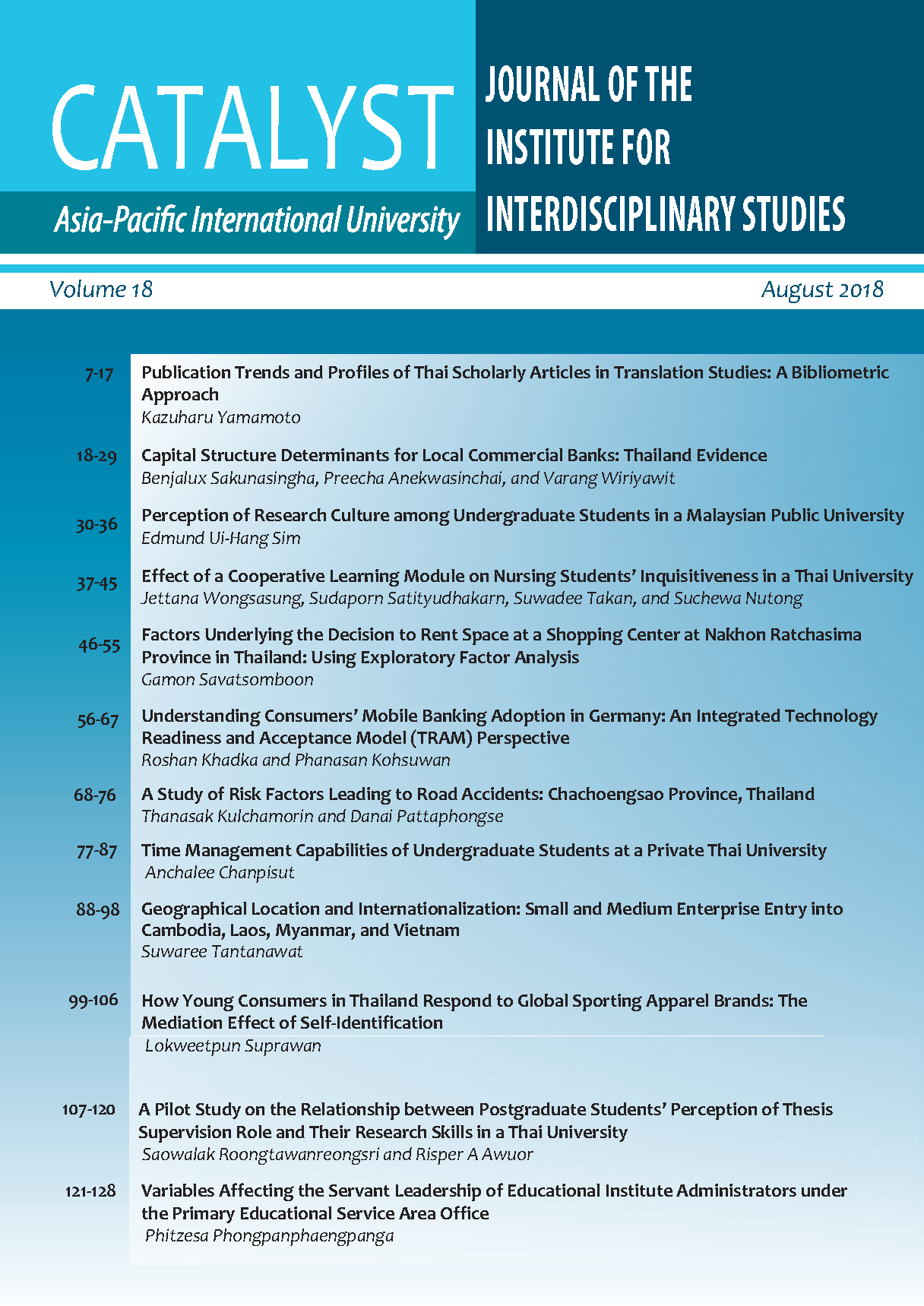Time Management Capabilities of Undergraduate Students at a Private Thai University
Main Article Content
Abstract
This research study examined the self-described time management capabilities of undergraduate students at a small private university in Thailand. Since completing a university degree requires taking many classes as well as participating in extracurricular activities, students need good time management skills to be successful. Developing such skills while they are still students will also help them to manage time effectively after they graduate and begin their professional lives. The research instrument used for collecting data was a five-rating scale questionnaire with 58 items. The sample consisted of 320 undergraduate students during the 2015/2016 academic year. These were classified by gender, age, program of study, year of study, cumulative grade point average (CGPA), residence accommodations, and means of financial support. The results show that students reported moderate levels of overall time management capabilities. In regards to planning time usage, female students reported a higher level of capability than male students did. In terms of formation of life objectives, students with government loans had higher scores than students who were self-financed.
Article Details

This work is licensed under a Creative Commons Attribution-NonCommercial-NoDerivatives 4.0 International License.
Copyright: Asia-Pacific International University reserve exclusive rights to publish, reproduce and distribute the manuscript and all contents therein.
References
Lim, S., Han, C., Uhlhaas, P., & Kaiser, M. (2015). Preferential detachment during human brain development: Age- and sex-specific structural connectivity in Diffusion Tensor Imaging (DTI) Data. Cerebral Cortex 25(6), 1477–1489. Retrieved from https://doi.org/10.1093/cercor/bht333
Lokam, P. (2007). Time management capabilities of undergraduate students at Srinakharinwirot University (Master’s thesis). Retrieved from http://thesis.swu.ac.th/swuthesis/Hi_Ed/Pim_L.pdf
Macan, T., Shahani, C., Dipboye, R., & Phillips, A. (1990). College students’ time management: Correlations with academic performance and stress. Journal of Educational Psychology, 82(4), 760-768. Retrieved from https://pdfs.semanticscholar.org/ea72/13c01261e9e172f1c362be3781df30f6f5b7.pdf
Misra, R., & Mckean, M. (2000). College students’ academic stress and its relation to their anxiety, time management, and leisure satisfaction. American Journal of Health Studies, 16(1), 41-51. Retrieved from https://www.researchgate.net/publication/209835950_College_students'academic_stress_and_its_r elation_to_their_anxiety_time_management_and_leisure_satisfaction
Mpofu, E., D'Amico, M., and Cleghorn, A. (1996). Time management practices in an African culture: Correlates with college academic grades. Canadian Journal of Behavioural Science/Revue canadienne des sciences du comportement, 28(2), 102-112. Retrieved from http://dx.doi.org/10.1037/0008-400X.28.2.102
Park, S. (2015). Effects of discipline-based career course on nursing students' career search self-efficacy, career preparation behavior, and perceptions of career barriers. Asian Nursing Research 9(3), 259-264. Retrieved from https://www.sciencedirect.com/science/article/pii/S1976131715000626#!
Persky, A., Alford, E., & Kyle, J. (2013). Not all hard work leads to learning. American Journal of Pharmaceutical Education, 77(5), 89. Retrieved from https://www.ncbi.nlm.nih.gov/pmc/articles/PMC3687122/
Poser, B. (2003). Time management for students. Retrieved from Counselling and Development Centre, York University. Website: http://www.aui.ma/personal/~A.Cads/1201x/read/crm1/Rdg3.pdf
Saketi, P., & Taheri, A. (2010). The relationship between time management and academic achievements among bachelor and master students of Shiraz University and Shiraz University of Medical Sciences. Iranian Journal of Medical Education, 10(3): 293-300. Retrieved from http://ijme.mui.ac.ir/article-1-1422en.pdf
Satija, S, & Satija, P. (2013). Time management: An insight with Indian perspective. SMS Varanasi, 5(2), 115-134. Retrieved from https://slidex.tips/download/time-management-an-insight-with-indian-perspective
Sattayawaksakul, D., Maidom, R., Cheewaprakobkit, P. (2016). Time management capabilities: A Case of the industrial workers of the Gulf Cogeneration Company Limited’s Clients. Journal of International Scholars’ Conference, 1(3), 243-255. Retrieved from http://jurnal.unai.edu/index.php/JISCBG/article/ view/411/309
Sevari, K., and Kandy, M. (2011). Time management skills impact on self-efficacy and academic performance. Journal of American Sciences, 7(12), 720-726. Retrieved from http://jofamericanscience.org/journals/ am-sci/am0712/093_7696am0712_720_726.pdf
Tanriogen, A., and Iscan, S. (2009). Time management skills of Pamukkale University students and their effects on academic achievement. Eurasian Journal of Education Research, 35, 93-108. Retrieved from http://www.ejer.com.tr/0DOWNLOAD/pdfler/eng/377153884.pdf
Worthley, R., MacNab, B., Brislin, R., Ito, K., & Rose, E. (2009). Workforce motivation in Japan: an examination of gender differences and management perceptions. The International Journal of Human Resource Management 20(7), 1503-1520. Retrieved from https://doi.org/10.1080/09585190902983421


